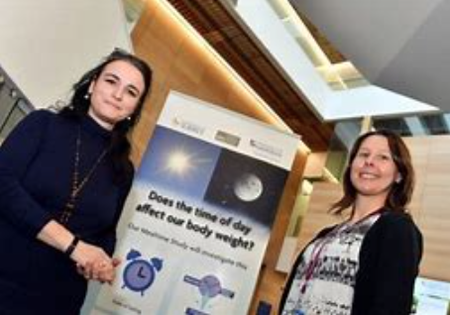Working from home has meant that there are new challenges for research, but also some now opportunities. For example, I was invited to give a “Little Lecture” as an online live presentation, which was an enjoyable experience to virtually meet people interested in nutrition research within the School of Medicine, Medical Sciences and Nutrition.
Much of my research has been around protein intake to promote satiety for weight control, but more recent emphasis has been applying this knowledge to consider the role of plant protein to promote healthy ageing. In the UK, it is projected that by 2035 the majority of the population will be aged 40 or older. With an ageing population, dietary approaches to promote health and independence later in life are needed. A gradual decline in muscle mass is observed from the third decade of life, with a 30–50% decrease reported between the ages of 40 and 80. Muscle strength is correlated with muscle mass and rapidly declines after the age of 50. This was a shock for me, as I do not consider myself as old!
Diet and exercise play a major part in preventing this muscle loss associated with ageing; so I need to keep going with my yoga, pilates and resistance training online! Ageing well can in part, be achieved by maintaining muscle mass and strength as people age. New evidence suggests that current dietary recommendations for protein intake may be insufficient to achieve this goal and that individuals might benefit by increasing their intake and frequency of consumption of high-quality protein. However, the environmental effects of increasing animal-protein production are a concern, and alternative, more sustainable protein sources should be considered.
Sustainable diets are proposed as a means to improve public health and food security and to reduce the impact of the food system on the environment. Guidance around sustainable diets includes a reduction of animal products in order to move towards a more plant‐based diet, meaning that plant‐originated foods are a predominant, but not the sole component of a diet. This is important as it is estimated that by 2030 the world’s population will reach 8.5 billion, with 1.4 billion being over 60 years old. Dietary approaches need to be not only environmentally sustainable but also healthy, economically fair and culturally acceptable. The main source of protein in the Western world diet is of animal origin, followed by dairy, and scarcely from plant sources - we are heavily reliant on animal sources of protein - this is not a sustainable approach!
A rapid transformation to a vegetarian diet is unlikely to be feasible on the global scale. While soya remains the leading global plant protein ingredient, there is a drive for ‘new’ plant protein sources. This has been driven by the notion that soya may not be as environmentally friendly as other alternative plant proteins. Indeed, the sources of proteins that are seeing the biggest growth for product development are pea, sunflower, pumpkin, rice, potato, quinoa and sacha inchi seed proteins. As a consequence, the demand for alternative sources of proteins, such as legumes (pea, chickpea), other vegetables, cereals such as oats and pseudo-cereals like quinoa and amaranth, is also increasing in Europe.
In conclusion, the concept of a ‘sustainable diet’ highlights the environmentally unsustainable nature of current consumption patterns in affluent societies. In theory, a sustainable diet is one that minimises environmental damage, supports a resilient farming & food industry and ensures that people eat a healthy and nutritionally-balanced diet. I hope that this gives you insight that what we eat, how much and how often, not only can impact on our own lives but can influence the health of the planet.
You can watch Prof Alexandra Johnstone's Little Lecture here.


